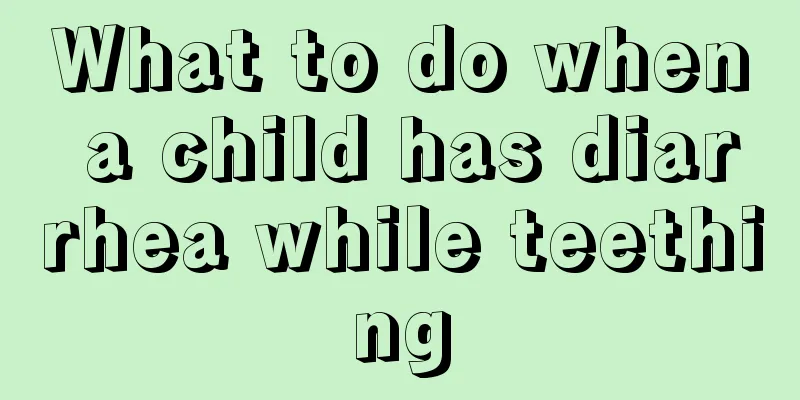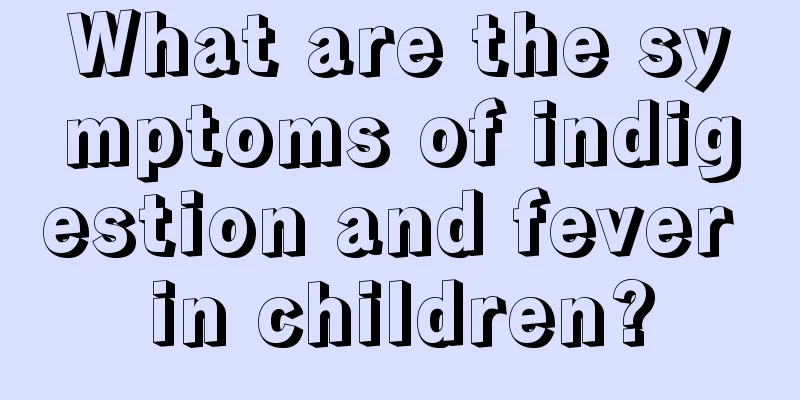What to do when a child has diarrhea while teething

|
Since the children are still relatively young, their organs and resistance are not fully developed. Especially during the period when the baby begins to grow teeth, complementary foods have already been added. Since the child's digestive system is not fully developed, bacterial or viral infections, indigestion, etc. can easily cause diarrhea in the baby. So, what should you do if a child has diarrhea due to teething? The following is a detailed introduction.
When the fetus is about 4 or 5 months old in the mother's body, the teeth are already calcifying and growing. The lower incisors will grow between birth and 6 months old, and will grow out at 7 months old if the baby is slower. However, since the antibodies brought by the mother at this time have gradually disappeared and the resistance is weak, the baby likes to chew things, so it is easy to get infected with diseases and have fever symptoms. In order to prevent the baby from chewing unclean objects, you can use wet gauze to massage his gums to relieve discomfort. The cause of diarrhea can be preliminarily determined from the characteristics of the baby's stool. The following are some abnormal stools and possible causes: 1. Green stool with a small amount of mucus and increased stool frequency often indicates hyperperistalsis, which is seen when hungry; 2. The stool is foamy and contains grayish white soap-like substances, indicating fat indigestion; 3. Stools that smell sour and contain a lot of foam indicate poor digestion of sugars;4. Stools that are very smelly and unformed indicate increased protein putrefaction; 5. Green or yellow stool, egg drop soup-like, often indicates improper diet or caused by extraintestinal infection; 6. Watery stools with frequent bowel movements are often caused by viral enteritis; Physiological diarrhea is common in breastfed infants, mostly occurring within 6 months. The reason This is because some nutrients in breast milk exceed the baby's needs, and the baby's digestive ability is not yet There is diarrhea caused by healthy development.
1. The frequency of bowel movements ranges from 2-3 to 8-9 times a day, and is like paste, with no special odor. 2. The child is a little bloated and often has milk rash on the face, behind the ears or along the hairline. 3. Although the child has diarrhea, the nutrients absorbed by his body still exceed those of ordinary children. Therefore, these children continue to gain weight while having diarrhea, and their weight is even heavier than other babies of the same age. Their growth and development are not affected, they have a good appetite, and they do not get sick. There is no need to wean the baby or use antidiarrheal drugs for physiological diarrhea. As the baby grows and his digestive function improves, gradually add porridge, noodles, fish, vegetable puree and other complementary foods, and the baby's bowel movements will gradually return to normal. |
<<: Is it normal to have teeth at 5 months old?
>>: The child said he had a headache. What's going on?
Recommend
How to choose a baby pillow
When choosing a pillow, you must pay attention to...
What to do if your baby has poor memory
Many mothers are worried about their children'...
What are the benefits of massage for children
Parents all hope that their children can be healt...
Factors that cause sneezing in infants and young children
In daily life, many young parents do not have muc...
How to prevent children from pollen allergies
In the spring season, there are many flowers in f...
Reasons why baby's lips are not red
Every parent wants their child to have rosy lips....
What to do if a full-month-old baby gets angry
When your baby is one month old, you need to pay ...
What should I do if my child keeps spitting up milk?
Spitting up milk is a common phenomenon. It is ma...
What is the color of a full-month baby's stool?
Babies cannot express their thoughts when they ar...
How can a newborn baby sleep to have a good head shape?
A first-time mother is paying close attention to ...
Symptoms and prevention of gastrointestinal cold in babies
The so-called "cold" is a general term ...
Sequelae of febrile seizures in children
It is very common for children to have high fever...
Why does my baby cough and spit up milk?
Once a child has a severe cough, he or she will o...
What to do if your baby has recurrent enteritis
If the baby has recurrent enteritis, parents must...
Reasons for high normal blood pressure in children
Hypertension is common among the elderly, but it ...









